Regional leadership - Health Sciences - Curtin University of ...
Regional leadership - Health Sciences - Curtin University of ...
Regional leadership - Health Sciences - Curtin University of ...
Create successful ePaper yourself
Turn your PDF publications into a flip-book with our unique Google optimized e-Paper software.
WRITTEN BY TONY MALKOVIC<br />
FEATURE<br />
Valuing the workplace<br />
COMPANIES STRUGGLING TO RECRUIT AND RETAIN STAFF DURING THE CURRENT SKILLS SHORTAGE<br />
DON’T NECESSARILY NEED FISTFULS OF DOLLARS TO TEMPT WORKERS: FINDING AND ADOPTING<br />
THE RIGHT CORPORATE VALUES CAN BE WHAT MAKES ALL THE DIFFERENCE.<br />
Pr<strong>of</strong>essor Tony Travaglione likes explaining<br />
how the introduction <strong>of</strong> corporate values<br />
needs to be backed by senior management<br />
by citing what happened to giant computer<br />
company IBM.<br />
About five years ago, IBM was in the<br />
doldrums and its CEO decided to realign the<br />
company’s direction by asking its workers to<br />
determine the values it should operate by.<br />
So, in a 72-hour online forum, he invited them<br />
to tell him what they thought the company<br />
should stand for.<br />
“That’s a very extensive exercise when you<br />
have hundreds <strong>of</strong> thousands <strong>of</strong> employees<br />
worldwide,” explains Travaglione, who is head<br />
<strong>of</strong> <strong>Curtin</strong>’s School <strong>of</strong> Management and a<br />
member <strong>of</strong> the <strong>University</strong>’s Leadership and<br />
Management Development Reference Group.<br />
“But IBM’s CEO, Sam Palmisano, was<br />
generally available to take emails from anyone<br />
around the world – people say that’s crazy,<br />
but it happened.”<br />
In the end, there were some 22,000<br />
responses, which the company distilled into<br />
three main values – dedication, innovation,<br />
and trust and personal responsibility –<br />
and IBM became a textbook case study for<br />
values-driven <strong>leadership</strong>.<br />
It’s about aligning the values <strong>of</strong> the employee, the organisation and the values <strong>of</strong> senior <strong>leadership</strong>.<br />
Travaglione – who is involved in a<br />
three-year $390,000 Australian Research<br />
Council project that is implementing a<br />
values-driven <strong>leadership</strong> model in one <strong>of</strong> WA’s<br />
largest public sector agencies, Main Roads<br />
WA (see accompanying story) – says values<br />
can basically serve as a ‘moral compass’<br />
for both organisations and employees.<br />
“When a person finds a company with<br />
similar values – say ‘green’ or environmental<br />
values, or a commitment to work-family<br />
values – they can <strong>of</strong>ten see a long-term<br />
future with that company. They see this as<br />
respecting them as individuals, which<br />
translates into trust and support in the<br />
workplace. Such workers are <strong>of</strong>ten better<br />
motivated and more loyal to the organisation.<br />
“It’s all about aligning the values <strong>of</strong> the<br />
6 review JUNE 2008 CURTIN BUSINESS SCHOOL<br />
ALLAN MYLES<br />
employee with the values <strong>of</strong> the organisation<br />
and the values <strong>of</strong> senior <strong>leadership</strong>.”<br />
In the current skills shortage, Travaglione<br />
says corporate headhunters <strong>of</strong>ten report<br />
feedback similar to the following from<br />
potential employees: “Okay, you want me to<br />
come to Perth, it’s pretty isolated and real<br />
estate prices are high, so what can you <strong>of</strong>fer<br />
me in terms <strong>of</strong> a work-life balance? I don’t<br />
have that now in London/Johannesburg/<br />
Sydney. Can I have a look at the values<br />
statement <strong>of</strong> the company that you’re trying<br />
to float me into?”.<br />
“And the first response if they can’t see<br />
that work-life balance in the company’s values<br />
will be ‘sorry, not interested’,” says<br />
Travaglione. “That’s the starting point for<br />
many people now, they’re saying straight out:<br />
‘I’m not making the big move if I don’t have<br />
that as one <strong>of</strong> the value statements’.”<br />
He says although a values-driven<br />
<strong>leadership</strong> model needs to start with the full<br />
support <strong>of</strong> the CEO and the senior <strong>leadership</strong><br />
team, it’s up to employees to get involved and<br />
decide what values the organisation stands<br />
for.<br />
“When Main Roads, or IBM, devised its<br />
values, it didn’t come about by four people<br />
sitting in a dark room. It wasn’t done by the<br />
PR department or the marketing department<br />
or the HR department, it started right at the<br />
ground floor and extended all the way up.<br />
It only gets ratified at the top. So people<br />
actually have ownership <strong>of</strong> this. There’s<br />
none <strong>of</strong> this ‘we plan to be world-best’;<br />
they’re realistic, because they are working<br />
L TO R: PROFESSOR TONY TRAVAGLIONE<br />
(HEAD OF SCHOOL OF MANAGEMENT), JOHN TAYA<br />
(HR EXECUTIVE DIRECTOR MAIN ROADS WA), MENNO<br />
HENNEVELD (COMMISSIONER OF MAIN ROADS WA)<br />
on the ground.”<br />
“Main Roads is an interesting example.<br />
It went from an organisation with a long,<br />
proud history to the brink <strong>of</strong> extinction and<br />
was revived to its current status as one <strong>of</strong><br />
Western Australia’s best performing public<br />
sector organisations through strong<br />
<strong>leadership</strong> and values-driven management.”<br />
Now in its third year, the Main Roads<br />
research project is currently focusing on<br />
helping employees and managers incorporate<br />
their agreed and adopted values into their<br />
day-to-day activities and decision-making so<br />
that both behaviour and values are aligned.<br />
Travaglione says that’s not always easy<br />
when, for years, managers might have been<br />
guided by policy statements handed down by<br />
various departments.<br />
“For example, an engineer managing a<br />
project worth millions <strong>of</strong> dollars might come<br />
up against a situation he or she is not familiar<br />
New approach passes road-test<br />
Main Roads WA has a big job. The<br />
organisation is responsible for the<br />
building and maintenance <strong>of</strong> roads across<br />
the State – an area that covers one-third<br />
<strong>of</strong> Australia and includes more than 17,500<br />
kilometres <strong>of</strong> highways and roads valued<br />
at over $27 billion.<br />
With a key focus on attracting and<br />
retaining staff for the future, the values<br />
adopted by the organisation over the past<br />
few years include: roads matter; working<br />
together; excellence in customer service;<br />
embracing challenge; pr<strong>of</strong>essionalism;<br />
and family.<br />
Menno Henneveld, the Commissioner <strong>of</strong><br />
Main Roads WA, says those values are one<br />
<strong>of</strong> several key areas that became part <strong>of</strong><br />
the agency’s push towards a greater<br />
customer focus.<br />
“When we started, we didn’t really have<br />
a clear idea what we were going to do with<br />
values-based management,” he explains.<br />
“But as a corporate executive, I felt we<br />
needed to move away from the standard<br />
black-and-white guidelines-type approach<br />
to decision-making that we had taken in<br />
the past.<br />
“We found there were circumstances<br />
where the guidelines, rules and standards<br />
didn’t help us in making decisions; that’s<br />
when you need to fall back on values,<br />
which is the concept we tried to get<br />
across to people.”<br />
He says staff were sceptical at first<br />
with. They can’t just pull out a policy manual,<br />
because the solution is not going to be in<br />
there. In terms <strong>of</strong> managing that project, that<br />
engineer has to have a set <strong>of</strong> organisational<br />
values that will help steer every decision he<br />
or she makes.”<br />
Travaglione says every executive meeting at<br />
Main Roads is now values-driven. If initiatives<br />
are not linked to the corporate values, there’s<br />
a fair chance they won’t proceed.<br />
“For instance, one initiative required funding<br />
to the occupational health and safety area to<br />
be increased to purchase certain products for<br />
employees. So people thought about it for a<br />
while – for about a whole 10 seconds – and<br />
said: ‘That’s one <strong>of</strong> our values, don’t worry<br />
about the cost’. And so it just happened.”<br />
Travaglione says a value-driven <strong>leadership</strong><br />
model – when implemented properly – has<br />
tangible results: recruitment costs are less,<br />
retention costs are less, job satisfaction is<br />
and felt a values-based management<br />
approach was a bit ‘touchy-feely’. But not<br />
any more.<br />
“The most pleasing thing is that<br />
employees talk about it,” he says. “I know<br />
<strong>of</strong> organisations where a lot <strong>of</strong> fuss has<br />
been made about values and they’re put<br />
in a picture frame on the wall, and that’s<br />
the end <strong>of</strong> it. But we wanted people to<br />
think about the values and how they<br />
affected their everyday decision-making.”<br />
We needed to move away from<br />
the standard black-and-white<br />
guidelines-type approach to<br />
decision-making that we had<br />
taken in the past.<br />
That approach has caught on to the<br />
extent that values are used in the agency’s<br />
selection processes and in its performance<br />
management <strong>of</strong> staff. They are also<br />
embedded in its business model.<br />
And it seems to be working. Main<br />
Roads has recently won several awards<br />
for its efforts, including the ‘Employer <strong>of</strong><br />
Choice’ (public sector category), ‘Best<br />
Graduate Intake’ and ‘Best HR Strategic<br />
Plan’ prizes in the 2007 Australian<br />
HR Awards.<br />
It also picked up a national ‘Excellence<br />
in People Management’ award from the<br />
Australian Human Resources Institute.<br />
higher, and there’s more stability in terms <strong>of</strong><br />
<strong>leadership</strong> in the overall organisation.<br />
“‘I actually enjoy going to work’ is the<br />
average response you’ll get from Main Roads<br />
employees, because they know what they’re<br />
doing sits comfortably with their values,” he<br />
explains. “So, at the end <strong>of</strong> the day, you’ve<br />
got people staying at Main Roads, earning<br />
maybe half <strong>of</strong> what they could be earning in<br />
the mining sector, because the values<br />
alignment is there.<br />
“Moving from a ‘corporate governance’ to<br />
a ‘corporate integrity’ approach is quite<br />
leading-edge. I think the Main Roads example<br />
will be followed with interest by other public<br />
sector organisations as community and<br />
government expectations change.”<br />
Contact: Pr<strong>of</strong>essor Tony Travaglione<br />
Email: T.Travaglione@curtin.edu.au<br />
review JUNE 2008 CURTIN BUSINESS SCHOOL<br />
7



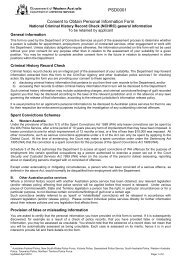
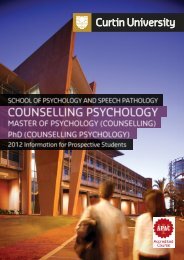
![Mental health commission report July 2010 - June 2011 [.pdf]](https://img.yumpu.com/50755705/1/184x260/mental-health-commission-report-july-2010-june-2011-pdf.jpg?quality=85)
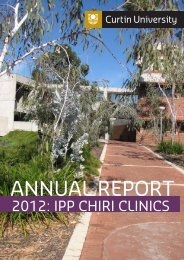
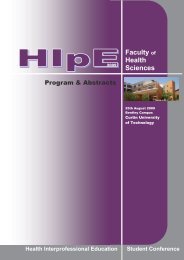
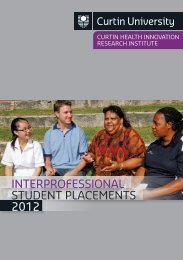
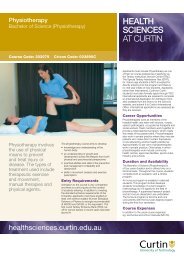
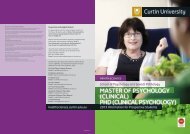


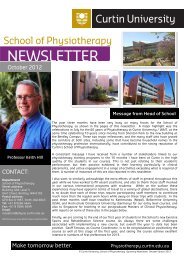


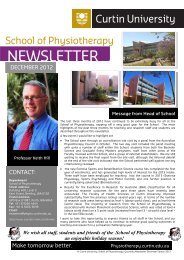
![2007 Annual Report [.pdf] - Health Sciences - Curtin University](https://img.yumpu.com/44476724/1/184x260/2007-annual-report-pdf-health-sciences-curtin-university.jpg?quality=85)